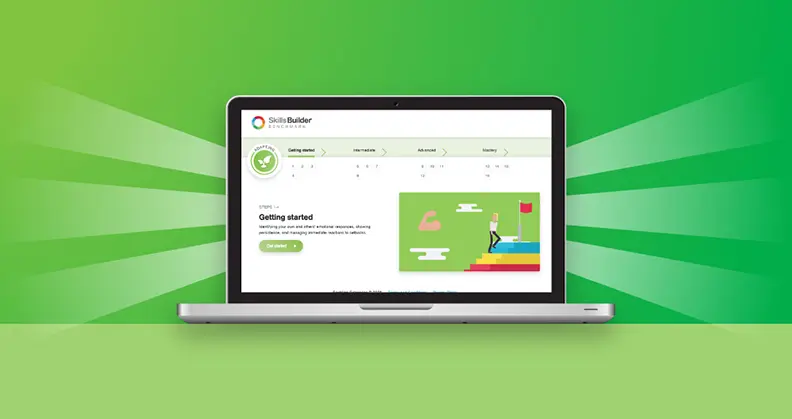From learning to share resources to working together towards a class project, pupils have a lot to learn as they are exposed to what it means to be a part of a team.
As educators, we have the task of teaching learners the power of teamwork, step by step. First, our learners need to learn how to work with others in a positive way by behaving appropriately, being on time and reliable, and taking responsibility for tasks. Importantly, they then need to learn to support others too in order to build the foundations of their teamwork skills.
Helping learners work with others in a positive way
Working positively with others is all about ensuring that everyone is able to achieve what they want to. This includes:
- Sharing things, like tools or materials
- Encouraging others by saying positive things about what they are doing
- Being pleasant, by being polite, kind and thoughtful about others
- Showing you want the work to go well by being enthusiastic.
Asking learners what they think it means to work positively, and encouraging them to give examples, is a good way for learners to reflect on this step themselves. Depending on the age of the learners, the question might be phrased as “taking turns” or “being friends with everyone in the class”.
To consolidate this learning, you could ask learners to create a set of posters or guidance about how they should work positively with each other. These pieces of work can act as reminders and teaching resources for the rest of the academic year as learners continue to build their teamwork skills.
Asking learners about when they struggle to work positively and what causes that can also be powerful. This can open a conversation about how negative emotions affect working and how learners can manage them effectively.
Supporting learners to work well with others by behaving appropriately
When asked to think about what the word behaviour means to them, younger learners are likely to immediately link this to “being well-behaved”. This is undoubtedly part of it, but not the whole picture.
We can guide learners to be more nuanced in their understanding of behaviour, encouraging them to take into account many different factors:
- How do we talk to other people?
- What do we talk about?
- How do we dress?
- What is our attitude towards what we are doing?
- What are the values we demonstrate?
In discussing these questions as a group, we can support learners to explore the idea of which behaviours are appropriate and which are unacceptable.
Learners often associate positive and negative behaviours with the school rules. While this is a helpful example, we can challenge them by questioning whether these same rules would apply in their own homes? This can open up the conversation to how different behaviours may be appropriate in different places. Learners can start to identify how they behave differently in different settings in order to build their teamwork skills.
Learning how to be reliable
At school, we learn quickly that we should be on time. However, it is also important to learn why being on time matters. We can start to build learners' understanding of why being late to school or to lessons has a negative effect, and learners could extend this to thinking about why this matters in their wider lives.
Being on time also allows people to learn to trust you. Reliability is about being consistently good at something. This might mean completing work to a good standard and trying hard every day. It also means that if you promise to do something that you get it done.
By exploring this concept with learners, we can question them to explore whether they think they are reliable in different aspects of their lives. A discussion can be structured around how learners could become more reliable. This could culminate with learners capturing some tips on how to boost their reliability or create actions or targets for themselves. Again, these teaching resources can be displayed and act as a visual cue for learners to continue to build their teamwork skills throughout the year.
Encouraging learners to take responsibility
The next step is to teach learners how to take responsibility for their actions. This means that they need to take charge of something and work to ensure that it is a success. It means that you get praise if it goes well, but it also means that you have to take the blame if it doesn’t go so well.
It can be difficult for learners to not feel defensive if something goes wrong, looking to make excuses or blame other people. However, the more we can support them to try to fix problems themselves, or find someone else to help, the more we can improve their teamwork skills.
Supporting learners to recognise the positive aspects of taking responsibility is also helpful, such as having a greater sense of ownership over your work and helping to build trust with others. In helping learners to understand why this is a necessary step, we can give them the motivation and confidence to start building this aspect of their teamwork skills.
To consolidate this learning, you could give learners a team challenge, where each individual has to take responsibility for their tasks in order for the whole job to be completed. For example, they may have to create a picture where each of them design a piece to form a whole at the end, or a presentation where each of them need to write and deliver a part in turn.
Teaching learners how to support others
We have already explored the building blocks of working with others: working positively, behaving appropriately, being on time and reliable, and taking responsibility for completing tasks. Next, we need to teach learners to be more outward facing and learn how to support others too.
Supporting others is an essential part of the teamwork skill and can take on a variety of different forms:
- Sharing tasks that benefit from there being two or more people involved
- Providing advice or showing how to do something if you have higher expertise and they ask for it
- Taking on tasks if you have time available while someone else still has lots to do
- Providing encouragement and inclusion if someone seems unsure or is lacking in confidence.
To support learners to experience this first-hand, learners can be given a piece of work to complete as a team, with tasks designed with varying challenge levels and then allocated to learners randomly. The challenge is then to see whether learners are able and willing to support one another, making sure everyone is included, to get everything done.
Why teaching teamwork matters
During their education, learners have opportunities on a daily basis to build and hone their teamwork skills. From working together during a think-pair-share activity to completing a science experiment, learners are constantly asked to work in a team. By using each of these naturally occurring opportunities to explicitly teach teamwork, and not needing to rely on extra teaching resources, we can accelerate their progress. We can teach them the steps and strategies to be positive members of a team and in doing so set them up to succeed when working with others.
Explore the Universal Framework’s steps to teamwork mastery, and download an Accelerator prospectus if you’re a school or college not yet working with us, to find out more about our education programme.






